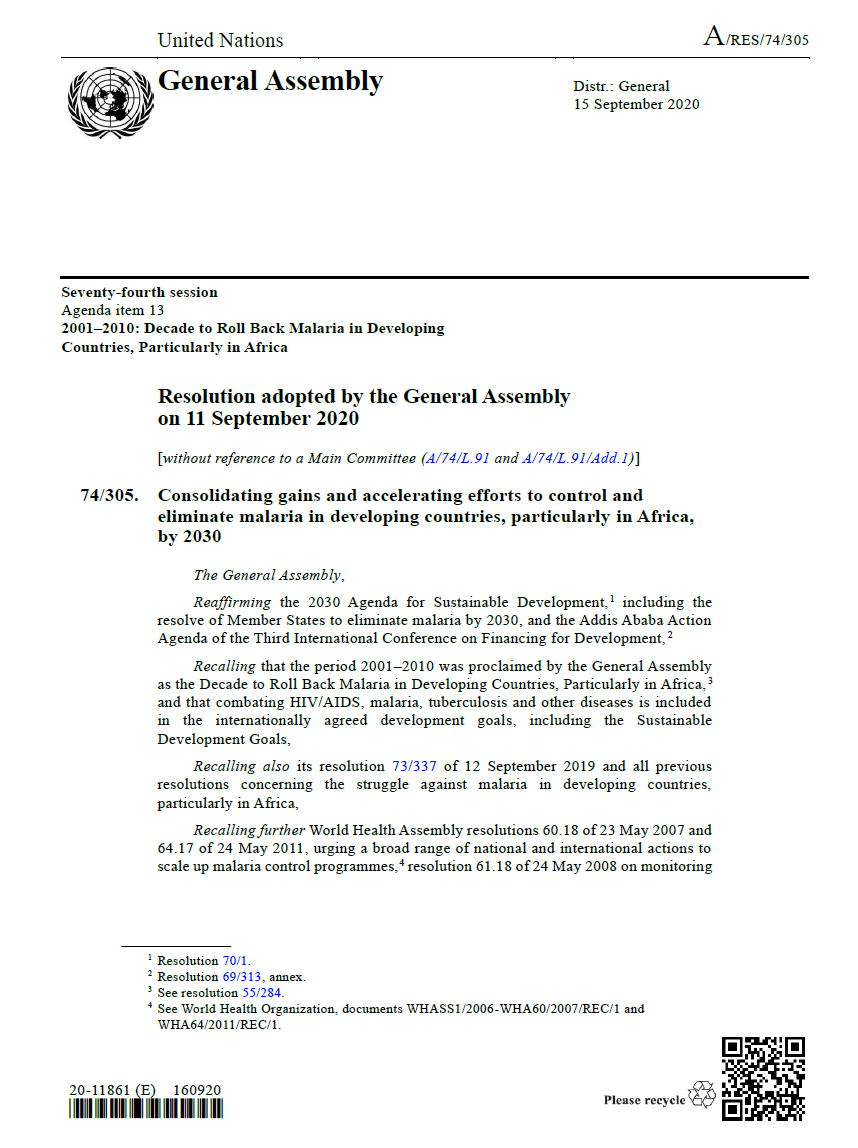2020 Resolution on consolidating gains and accelerating efforts to control and eliminate malaria in developing countries, particularly in Africa, by 2030
Analysis of precedential value
This resolution was adopted by the UN General Assembly (UNGA) without a general vote in September 2020. The UNGA is the preeminent governing body of the UN system and consists of all 193 UN Member States.
Used as precedent
key population and community leadership
“Affirms that close collaboration with community leaders and implementing partners, including non-governmental organizations, health workers and volunteers, is an essential factor for success in combating malaria, and calls upon Member States to introduce integrated, people-centred community services, in coordination with health-care providers in the public and private sectors, and to continue efforts to collaborate with non-governmental partners, health workers and volunteers in implementing community-based approaches to reach populations in remote and hard- to-reach areas” (p. 8)
access to health products
“Calls upon Member States to promote access to medicines, and emphasizes that access to affordable and quality medicines and medical care in the event of sickness, as well as in the prevention, treatment and control of diseases, is central to the realization of the right to the enjoyment of the highest attainable standard of physical and mental health” (p. 9)
“Reaffirms the right to use, to the fullest extent, the provisions contained in the World Trade Organization Agreement on Trade-Related Aspects of Intellectual Property Rights (TRIPS Agreement), the Doha Declaration on the TRIPS Agreement and Public Health, the decision of the General Council of the World Trade Organization of 30 August 2003 on the implementation of paragraph 6 of the Doha Declaration on the TRIPS Agreement and Public Health, and the latest amendment to article 31 of the TRIPS Agreement, which came into effect in January 2017, which provides flexibilities for the protection of public health, and in particular to promote access to medicines for all and to encourage the provision of assistance to developing countries in this regard, and calls for the broad and timely acceptance of the amendment to article 31 of the Agreement, as proposed by the General Council of the World Trade Organization in its decision of 6 December 2005, while recognizing that the protection of intellectual property is important for the development of new medicine” (p. 10)
“Calls upon the international community to support ways to expand access to affordable, effective and safe products and treatments, such as vector control measures, including indoor residual spraying, long-lasting insecticidal nets, including through the free distribution of such nets, adequate diagnostic facilities, intermittent preventive therapies for pregnant women, children under 5 and infants, and artemisinin-based combination therapy for populations at risk of falciparum malaria infection in endemic countries, particularly in Africa, including through additional funds and innovative mechanisms, inter alia, for the financing and scaling up of artemisinin production and procurement, as appropriate, to meet the increased need” (p. 11)
